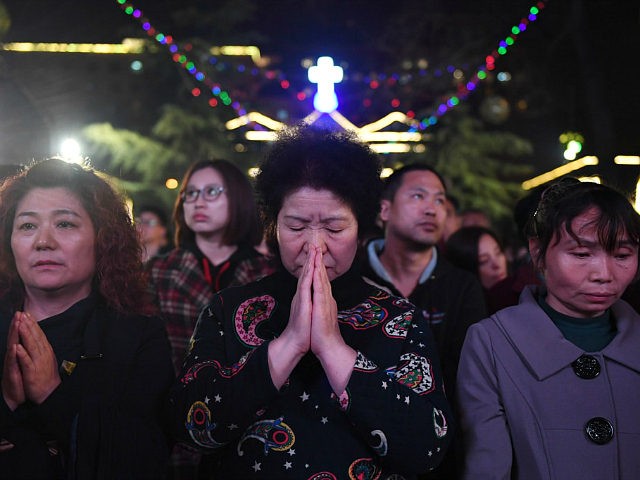2018 brought one of China’s worst crackdowns on religion, from the astonishing persecution of the Uighur Muslims in Xinjiang province to a series of raids against “underground” Christian churches.
Some Chinese cities banned Christmas decorations and celebrations in an effort to establish the primacy of the communist government and stoke the fires of nationalism at the height of a trade war with the United States.
The South China Morning Post found this Christmas less “cheerful and bustling than other years” in China:
Christmas decorations reportedly have been banned in at least four cities this year, including Langfang, about 55km (34 miles) south of Beijing, where shop windows were stripped of Christmas stickers and streets were kept free of Christmas banners and lights.
The seasonal humbug follows similar outbreaks of anti-Christmas rhetoric in 2014 and 2017. It appears not to be centrally organized, but rather a spreading resistance to foreign festivals by local authorities seeking to align themselves with a changing outlook in the Chinese government.
The capital itself seems free from such bans, though. As a South China Morning Post reporter found, people were continuing to mark Christmas across the sprawling metropolis in ways both commercial and religious, though for the most part Christmas has largely continued to be a shopping festival in Beijing and other cities.
It is not surprising that Beijing would try to appear more relaxed and inclusive to foreign visitors, or that the central government would feel less insecure about the appeal of religion in the seat of its power. Elsewhere in China, regulators were emboldened to go after “unauthorized religious gatherings” by recent amendments to the law.
“It is impossible to have large gatherings. All we can do is get together and celebrate Christmas in small groups,” said one member of an underground church whose founder is currently under house arrest.
On Christmas Eve, the SCMP reported all of the Christmas trees, lights, and bells vanished from a 27-story shopping and office building in the city of Nanyang in less than 24 hours, all the way down to the giant teddy bear who once greeted visitors at the entrance to the shopping area.
Students of President Xi Jinping’s doctrine say the government increasingly views Christmas as a “foreign cultural element” that must be purged for the sake of national unity. Television programs emphasize the importance of Chinese culture over “ostentatious Christmas celebrations.” Extra police have been deployed to prevent overly enthusiastic festivities.
Pressed about these measures, Chinese officials and state-run media insisted they are merely trying to prevent road blockages, illegal street vendors, and excessive clutter from Christmas decorations. Religious freedom activists countered by leaking memos that placed onerous restrictions upon Christmas celebrations and urged the insertion of Communist Party “values” into holiday sermons at government-approved churches.
Despite these efforts, activists said young people in China are increasingly enthusiastic about the Christmas holiday, and some analysts believe Christianity is the fastest-growing religion — which could pose a serious challenge to Xi’s agenda, especially his plan to redefine “human rights” in collectivist terms.
The New York Times found Christians defiant in the face of several large churches getting shut down by the police in the fall and winter:
At Chengdu Xishuipang Reformed Church, a Protestant church with close ties to Early Rain, more than 100 people gathered inside a worship hall on the 16th floor of an apartment building.
A children’s choir sang “Silent Night,” and a small Christmas tree, decorated with snowflakes, was on display near the lectern.
The anxieties brought on by the recent arrests hung over the ceremony.
“If you see the police, national security or community workers greet them with gentleness,” Wen Hongbin, an elder at Xishuipang, told the congregation. “If they try to grab the microphone, I ask the brothers sitting in the front row to please stop them.”
The NYT quoted Christian Gu Baoluo, who was looking forward to a “boisterous Christmas celebration” at his Early Rain Covenant Church before the government raided the church a few weeks ago and arrested its pastor, Wang Yi, on charges of “subversion.” Gu had to make do with a smaller, quieter Christmas Eve service at a friend’s house, using encrypted communications to talk with other congregants.
“We will not forfeit our faith because of suppression by the authorities,” Gu nevertheless declared.
Gu said he was baptized into the Early Rain church last year because he saw “injustice” in Chinese society and realized his government’s “promotion of China as a just country that enforces laws in a civilized manner was all a lie.” He said he fears for his safety in the wake of Pastor Wang’s arrest and has closed his rice-selling business.
The NYT found the Vatican regrettably silent about the crackdown, having reached an understanding with the Chinese government that grants Catholicism a measure of protection by giving the Chinese state a role in selecting bishops in exchange for some recognition of papal authority.
Olivia Enos of the Heritage Foundation noted at Forbes that China usually launches or intensifies crackdowns on religious holidays, as with the pre-Christmas assault on Christian churches or heavier persecution of the Uighurs before Ramadan. This is presumably done to demoralize the targets.
Several Hong Kong Christian congregations dressed in black for Sunday services before Christmas to show their solidarity with Pastor Wang and the other Christians imprisoned by mainland China.

COMMENTS
Please let us know if you're having issues with commenting.